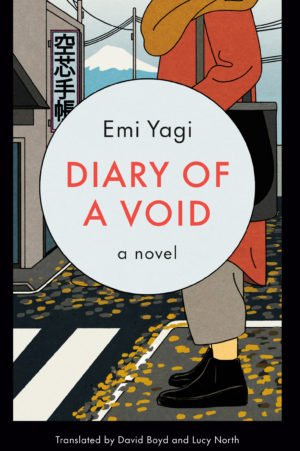Diary of a Void
by Emi Yagi, translated by David Boyd and Lucy North
reviewed by Olive Fellows
Emi Yagi’s delicately wrought debut novel Diary of a Void is about the allure of alternate lives. The protagonist Ms. Shibata’s imaginary baby is the brainchild of curiosity: what would happen if she left the conference room a mess after a big meeting? Since starting her mundane office job at a Tokyo paper-core manufacturing company, becoming the only woman in a sea of men, she’s been expected to do little things outside of her job description: make coffee for everyone during a client visit, replenish the printer ink, tidy up around the office. Small tasks that, when combined, equal a second workload.
One fateful morning she decides to test if any of her coworkers will take over the cleanup if she doesn’t handle it as usual. Will the grown men pick up after themselves unprompted? The answer becomes clear when Shibata’s section head approaches her, requesting her help with the coffee cups. Maybe it’s silent rage, maybe her patience has just run out, because she lies, saying she can’t take care of the mess because the smell of the old coffee triggers her morning sickness. “And that’s how I became pregnant,” she explains.
Her fake pregnancy lies at the center of Diary of a Void, collaboratively translated from the Japanese by David Boyd and Lucy North, though we’re frequently tempted to forget there’s no baby on the way. Even the chapter titles lull us into a state of acceptance: chapter one is titled “Week 5,” the stage Shibata decides she’s reached after arbitrarily giving the Human Resources department a May due date. The chapter names march through the remaining 35 weeks, showing just how far Shibata is willing to take this fantasy.
There are perks to being pregnant, it turns out, even if it’s make-believe. Shibata always gets a seat on public transit. She’s no longer expected to stay late at the office and therefore has extra time to go to the concerts that she loves and to spend more time at her apartment watching movies. But she benefits most when she joins an aerobics class for expectant mothers. The other participants coax the normally reserved Shibata out of her shell and give her a sense of community.
Her pregnancy deception is conceived in a moment of anger, but we begin to see the loneliness behind it. Shibata feels out of place in her office and bogged down by the relentless churn of everyday life. “The office was a swamp,” Yagi writes. “Not a deep one. But one that let off a weird-smelling gas all year round.” She sees the emptiness of her days reflected in a trip to her company’s paper-core factory, where they create commonplace objects, useless until placed at the center of a roll of wallpaper, holding a blank space in the middle. Yet, weeks later, after convincing everyone that she’ll soon have a child to take care of (while instead she’s finally caring for herself and building a support system around her), she revisits the factory with fresh eyes:
There was nothing here dazzling enough to describe as magic, nor was there cutting-edge technology to marvel at. The spell was in the obsession, the relentless intensity. Words summon more words, making space for a new story to come into the world. Solemnly, modestly, reverently. The core had to be hollow. Where else was the story to go?
Her pregnancy, feeling realer to her by the day, reshapes her view of the void at the center of the paper tubes: what was once the embodiment of emptiness becomes a wide-open space for opportunity.
Railing against workaday culture isn’t the book’s sole purpose, and Yagi never allows Diary of a Void to veer into depressing territory. Shibata’s dry observations about her surroundings lighten the mood. A Christmastime scene in which a drunk Shibata attempts to have a heart-to-heart with an image of the Virgin Mary on a tableau in a shop window (“It must have been so hard. Finding out you were pregnant, no idea how it happened, then getting visited by those angels or whatever”) is among the best in this debut. Even the name Shibata selects for her “child” (“Sorato, with two kanji: the first for ‘sky,’ or ‘air,’ like ‘out of thin air,’ and the second for ‘person’”) is hilarious in its wordplay, a credit to translators Boyd and North, who preserve clever turns of phrase and make the fact that this is a translated book nearly imperceptible.
Diary of a Void leans heavily on a storyline that’s been endlessly recycled in sitcoms and Lifetime movies, but what makes the pregnancy hoax angle fresh here is the lack of overwrought drama. Shibata doesn’t pull out all the stops to convince everyone she has a baby on the way—she merely allows people to believe what they want to believe and uses the experience to discover what she really wants out of life. This is a sweetly surreal novel about seeking respect and human connection in an increasingly isolated world.
Published on December 1, 2022

